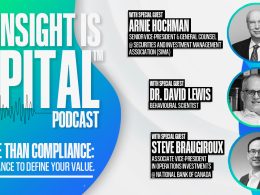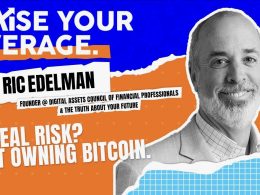by David Robertson, CFA, Areté Asset Management
Most people are familiar with Thomas Edison’s quote that “genius is one percent inspiration and ninety-nine percent perspiration.” In making this statement he was trying to disabuse people of the notion that innovation “just happens.” Rather, it requires a lot of hard work.
Another notion that often needs to be disabused is that the key to successful investing is primarily intellect. This misplaced focus underestimates the role emotions can have in overwhelming reason and also underemphasizes the role many of our behavioral tendencies can have in undermining broader goals. It also makes the examination of these tendencies an especially fruitful exercise for long term investors.
As it turns out, Charlie Munger, a long-term investor extraordinaire, made a special point of highlighting the importance of behavior for investment success:
“A lot of people with high IQs are terrible investors because they’ve got terrible temperaments. And that is why we say that having a certain kind of temperament is more important than brains …”
This point was also singled out by behavioral economist, Dan Ariely, by way of a memorable demonstration at the CFA Annual Conference ten years ago. The exercise involved bidding for a twenty-dollar bill. The only rule was that when the bidding stopped, the payer for the bill would not be the highest bidder, but the second highest bidder.
Immediately several hands went up. Five dollars. Six. Seven. Eight. Then several people stopped bidding. Two remained. Seventeen. Eighteen. Nineteen. Twenty. Twenty-one.
Of course, at this point, it became abundantly clear that whoever stopped bidding would also be the loser and have to pay. As a result, there was an incentive to keep bidding despite the obviously absurd consequences. And so the bidding went on. Thirty. Thirty-one. Thirty-two.
When the bidding finally stopped, it was significantly over twenty dollars. Someone won $20 and someone else not only had to pay for it but paid a hefty premium too. As such, the exercise left everyone in the room with a memorable impression.
It also provided a memorable lesson: It is incredibly hard for us to think long term and therefore it is often hard to see the “end game”. Not surprisingly, this quirk can end up being costly.
This phenomenon arises in many aspects of our lives and in many walks of life. We compete for small, incremental advantages on a routine basis and do so without considering big picture ramifications. The same things also happen in more public spheres where the impact can be much greater.
One of the more visible areas is stock trading. The dramatic rebound in stocks since late March can be attributed in part to expansive fiscal and monetary stimulus and to an abiding belief that you can’t “fight the Fed”.
A closer look at policy measures reveals much greater focus on short-term goals than long-term ones. While fiscal stimulus did cushion the blow of lost incomes and monetary stimulus eased constraints on liquidity, neither program provided meaningful support for future growth. Further, forbearance of rents and mortgages and the deferral of ratings downgrades change the timing of recognition of problems but do nothing to fix problems. Finally, when these problems eventually become manifested in bankruptcies, they will destroy liquidity. We just don’t know by how much yet.
As a result, bets on a quick and fairly complete recovery of stocks have all the markings of gambles instead of investments. Indeed, increasing evidence reveals this is exactly what is happening. As lockdowns have severely limited opportunities for sports betting, a number of gamblers are turning to stocks. The Financial Times describes:
“Gamblers who cannot bet on professional sport because fixtures have been scrapped are flocking instead to the US stock market, creating a new class of customer for online brokerages and adding fuel to the market rally.”
One of the new stock market participants captured the sentiment:
“I’m not here for the long run — I just want to throw a thousand bucks at something to see if I can make a few hundred”.
The point here is not to condemn people who are drawn to speculation. It is not something I endorse, but as long as it doesn’t hurt anyone else, I don’t have a big problem with it.
Rather, the point is to highlight the degree to which speculative and short-term oriented behavior has permeated society. When long-term investors see stock prices rising against a backdrop of terrible economic news, it can be helpful to understand that these bizarre circumstances are more a function of speculative tendencies than of sound fundamental reasoning.
Unfortunately, focus on the short-term at the expense of more important longer-term goals has also permeated public policy circles (where it can hurt lots of people).
For instance, we have plenty of evidence now that monetary policy has been conducted with an insufficient appreciation of the end game. During the financial crisis of 2008 (GFC), many unconventional policies were designed with one overarching goal: to stop the unraveling of markets in housing and stocks and bonds.
What resulted was a potpourri of unconventional policies including exceptionally low rates and quantitative easing. Given the urgency of improving market functioning, longer term concerns about moral hazard, perverse incentives, and counterproductive behavior were sidelined.
Now, twelve years later, we can see that low rates led (predictably) to more borrowing. Quantitative easing reduced volatility to such a degree that complacency increased. In addition, persistent fiscal deficits have caused government debt to increase. And higher
levels of debt have constrained growth. In short, many of the short-term challenges from the GFC have morphed into even bigger problems today.
The public policy response to the coronavirus has also revealed an insufficient appreciation of the end game in many respects. For starters, the virus is extremely contagious which means its spread is an exponential function. This alone is all that needs to be understood to appreciate the absolute urgency of addressing the problem early and comprehensively. And yet, the initial reaction from policy makers in both China and the US was to ignore the threat and hope it would go away. In both cases, short-term expediency proved costly and quickly eliminated several useful response options.
Later, policies of sheltering in place were rolled out, but again, with little apparent consideration of the consequences. While the lockdowns did serve the immediate purpose of staunching the spread of the disease, they came at the expense of dealing a powerful economic blow to many businesses. It is hard to find any evidence of careful consideration of tradeoffs or longer-term consequences of these policies.
In aggregate, these examples are interesting because they demonstrate just how pervasively decisions get made without proper consideration of the end game.
Part of the reason for this is a widely accepted belief system that emergencies demand a singular focus and a separate set of rules. Accordingly, time is of the essence and all efforts should be made to expedite resolution. You simply don’t have the luxury of entertaining secondary considerations.
Of course, there is truth to this right-sounding mandate. From another perspective, however, it simply enables the all-too-human tendency to overlook long-term consequences. Interestingly, there is no dearth of critical situations and emergencies encountered by military special forces, but they embrace a different approach: Slow is smooth. Smooth is fast.
This implies that it is not just speed that is crucial, but also correct action. It also implies that speed without smoothness is often counterproductive. It is important to be deliberate. Get it right the first time, and you won’t have to waste time or miss an opportunity.
All of this really comes back to risk. It is a lot easier to get by without considering long-term implications if the consequences are trivial. It is a lot harder if the consequences are severe. For example, what if you lost an enormous share of your retirement assets?
To this point, Morgan Housel recently provided a vivid illustration of risk. Suffice it to say, when you have experienced meaningful risk firsthand, you don’t mess around with it. In his words, “tail-end consequences – the low-probability, high-impact events – are all that matter.”
This turns the tables on how many investors think about risk. Many investors think of risk in relation to benchmark performance. Others think of risk in terms of long-term averages for major indexes. Some completely disregard low probability events. All of these overlook the bigger point: it is the relatively rare, high-impact events that are all that matter for the end game.
By contrast, veteran investor, Felix Zulauf, showed what such an approach to risk looks like in practice. Presenting recently at John Mauldin’s Strategic Investment Conference. Zulauf explained that he is not finding attractive investment opportunities in the presence of so many constraints on global growth and excessively high debt levels. As a result, he “has been out of the market since 2015.”
At a time when many investors are feverishly trying to expand their retirement pots, it can be tempting to chase short-term opportunities to gain marginal advantages. In doing so, however, it is absolutely essential to keep the end game in mind and to avoid high-impact events. Munger may have summed it up best,
“The big money is not in the buying and selling. But in the waiting.”
*****
David Robertson CFA is the CEO of Areté Asset Management and founded Areté with the mission of helping people to get the most out of their investing activities. Most of his career has focused on researching stocks and markets, valuing securities, and managing portfolios for mutual funds, institutional accounts, and individuals. He has a BA in math from Grinnell College and a Masters of Management from the Kellogg School of Management at Northwestern University. Follow Dave on LinkedIn and Twitter.














